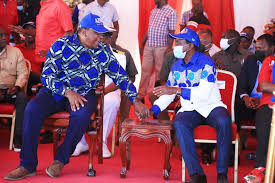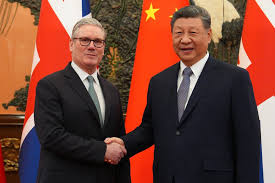David Lammy intends to keep the most dangerous criminals in solitary confinement, eating, exercising and sleeping alone 24 hours a day - Stefan Rousseau/PA
Britain’s most dangerous extremist prisoners will be kept in “supermax” units similar to those in US jails, David Lammy has announced.
Offenders will be largely held in solitary confinement, eating, exercising and sleeping alone 24/7 under a high-security prison regime similar to ADX Florence, the supermax in Colorado nicknamed the Alcatraz of the Rockies.
The Justice Secretary also told MPs that he would consider new legislation to prevent prisoners held in the new units from using human rights laws to challenge the tougher conditions.
Extremist prisoners have access to the numbers of 15 lawyers from their in-cell phones and have used the present rules to bombard prison bosses with hundreds of legal claims to soften their regime.
The moves come after Hashem Abedi, the Manchester Arena bomb plotter, allegedly carried out a “terrorist” attack on prison officers at a maximum-security jail with hot cooking oil and makeshift knives.
The changes were recommended by Jonathan Hall, the independent reviewer of terrorism legislation, who said Abedi’s attack on three prison officers at HMP Frankland showed urgent reforms were needed to protect staff and prevent extremists radicalising other prisoners.
Mr Hall said the current system – where extremists are held in three “separation centres” within high-security jails – was flawed.
He said the centres sought to offer the prisoners the equivalent of a mainstream regime where they had time out of cells, could mix with other inmates in their units and had access to gyms and canteens.
He said this approach had made it a “touchstone of legal vulnerability” because staff feared that if they tried to restrict what prisoners could do, they would face legal challenges that they were being treated too harshly.
Mr Hall, who visited the ADX Florence in Colorado for his report, instead proposed a new three-tiered system where the most dangerous extremists would be placed in “deep custody”, in a closely supervised unit isolated even from other prisoners within the separation centres.
They might be allowed to associate with one other named prisoner but would otherwise be kept in solitary confinement, similar to the US supermax units, where the criminals exercise alone in concrete, caged areas and live in cells designed to limit contact with the outside world.
In his report, Mr Hall said it would be designed for prisoners such as Abedi “before they have a chance to commit a more serious attack”.
There would be an intermediate level for prisoners, where they would be able to mix with “smaller cohorts” of inmates and have access to some facilities such as a gym.
The highest tier would allow greater time out of cells, association and more facilities including possibly “self cooking” which is highly valued by prisoners.
Mr Lammy said movement between tiers by prisoners would only be permitted following rigorous new risk assessments. “We will begin designing this system immediately,” he said.
The Justice Secretary said he would also consider whether new legislation was needed to prevent prisoners using Article 8 of the European Convention on Human Rights (ECHR) to challenge their conditions.
Two extremist prisoners held in separation centres have successfully argued before the High Court that limiting access to the gym, library, and educational opportunities and associate with other inmates violated their Article 8 rights to a private life.
“I recommend that the Ministry of Justice take steps to limit the application of Article 8 of the ECHR so that it does not apply to placement within a separation centre or to risk management decisions within any part of the separation centre system,” said Mr Hall.
Nick Timothy, the shadow justice secretary, said the Government should go further and leave the European Convention on Human Rights to stop prisoners using it to “escape separation centres”. Story by










